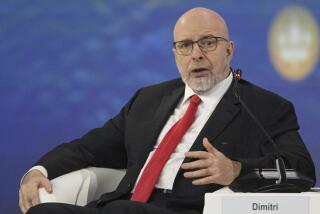Russian Tycoon Held on Warrant
- Share via
MOSCOW — In an apparent escalation of the Russian government’s crackdown on wealthy oligarchs, former media magnate Vladimir A. Gusinsky has been arrested in Greece on a 2-year-old international warrant charging him with fraud and money laundering in Russia, authorities said Saturday.
The once-powerful businessman -- whose media outlets regularly criticized Russian President Vladimir V. Putin and represented one of the last independent television news sources in Russia -- was being held at an airport detention facility in Athens after being detained during a flight stopover, Greek television reported.
It was not clear whether Russian authorities had renewed their attempts to take Gusinsky into custody or whether the Greek government, which has close ties to Russia, acted on its own.
Gusinsky holds dual citizenship in Russia and Israel, where he has lived in self-imposed exile since 2001. Several sources said Gusinsky has reportedly made trips to the U.S., France and Spain, but authorities had not pursued the Interpol warrant for two years.
“The real question is, why now?” said Liliya Shevtsova, a leading analyst with the Moscow Carnegie Center. “One of the reasons why Gusinsky’s arrest comes now and not any other time is the possible intensification of the attack on the oligarchs mounted by the Russian law enforcement bodies. It is yet another evidence that at least part of the Kremlin team is rather resolute when it comes to dealing with the Russian oligarchs.”
Since July, Russian prosecutors have been conducting a wide-ranging investigation of oligarch Mikhail Khodorkovsky’s Yukos Oil and have held key business partner Platon Lebedev and security director Alexei Pichugin behind bars.
Most analysts believe that the inquiry is a political message to Khodorkovsky -- who has donated some of his billions to opposition political parties and has been mentioned as a possible presidential candidate -- to stay out of politics if he wants to remain in business.
Even before the government’s recent, highly publicized showdown with Yukos, Gusinsky and fellow media tycoon Boris A. Berezovsky had become Kremlin targets, forced out of most of their Russian business holdings and driven into exile to avoid likely imprisonment. Berezovsky, living in Britain, published an open letter this month warning of “a creeping anti-constitutional coup” in light of the crackdown on big businessmen.
Gusinsky had explored investments in Israeli media and even was said to have considered running for the Knesset.
The 51-year-old tycoon, a former theater director who exploited his connections to build the Media-Most banking and media empire, was the last independent owner of the NTV television station in Moscow before it was acquired by the government gas giant, Gazprom.
NTV and Gusinsky’s other media outlets often negatively portrayed the war in the republic of Chechnya and reported on Kremlin corruption. In June 2000, Gusinsky was arrested on charges of embezzling millions of dollars in government property.
Those charges were later dropped, but the federal prosecutor later sought an international warrant accusing the tycoon, among other things, of smuggling $250 million out of Russia, according to the Interfax news agency.
In original charges, Gusinsky was arrested at his house in Spain in December 2000 and moved to Israel the following April after a Spanish court rejected a Russian demand for his extradition. His former lawyer in Moscow, Henry Reznik, said he was no longer handling the case and was not familiar with the details, but had heard an unconfirmed report that Gusinsky’s plane had been ordered to land in Athens.
“The criminal proceedings against Gusinsky have not been dropped in Russia, and it looks rather logical that attempts have been made to have Gusinsky delivered to Russia,” Reznik said.
Shevtsova, the analyst, said Gusinsky should have known that Greece might not be safe for him.
“We all make mistakes, and Gusinsky has just made one. His security and analytical services should have warned him about it not being safe to go to Greece,” she said.
But some sources close to Gusinsky questioned whether Russia was, in fact, actively seeking to detain the businessman, or whether it might have been a case of bad timing.
“The most interesting and unclear thing is the reaction of the Russian prosecutor general’s office -- there simply is not any,” said a former senior employee of Media-Most, who spoke on condition of anonymity. “In a situation when they logically should be jumping with joy, they are just silent.”
*
Alexei V. Kuznetsov of The Times’ Moscow Bureau contributed to this report.
More to Read
Sign up for Essential California
The most important California stories and recommendations in your inbox every morning.
You may occasionally receive promotional content from the Los Angeles Times.









